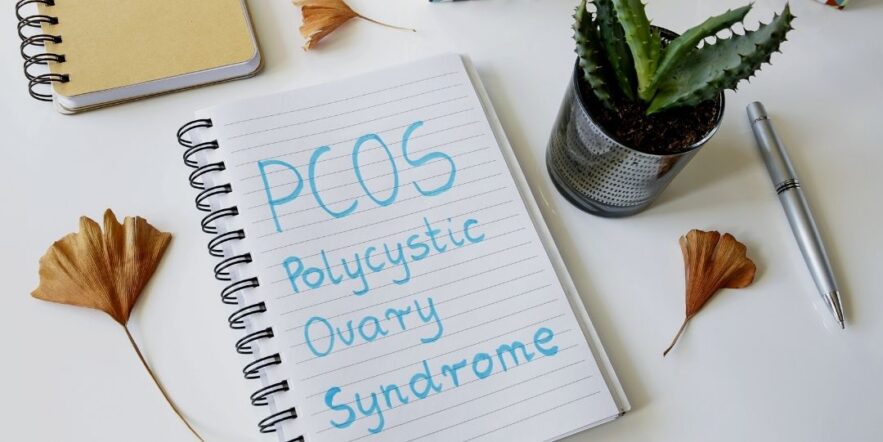Mother-of-four Kate Leighton, 43, found out she had PCOS (polycystic ovary syndrome) as a teenager. Although physicians had recommended various treatments, such as oral contraceptives to manage her menstrual cycle and Clomid (clomiphene) for fertility, no one mentioned the role of diet and exercise in PCOS management. She found those strategies by doing her own research.
“On my 37th birthday, I went vegan. I lost 50 pounds, and chose the months I wanted to become pregnant. Six months of a vegan diet, and no more cysts,” she says.
The goal of managing PCOS is for women to decrease the risk of diabetes, increase fertility, lose weight, have less acne and unwanted facial hair and be diagnosed with fewer ovarian cysts on ultrasound.
Medical management options include a very long list of drugs: oral contraceptives to regulate menstrual cycles, metformin (Glucophage) to manage insulin resistance, clomiphene citrate or letrozole to stimulate ovulation, ovarian drilling to remove excess cysts, dermatological remedies for acne and excess facial hair, and more intensive fertility treatments for conception. That’s a lot of medicines for your body to metabolize, multiple potential side effects and unknown risks of interactions with any other meds you might need.
As Leighton discovered, you have a choice in how to treat PCOS. Research shows that combining healthy diet and exercise with medical management can lead to added weight loss and PCOS symptom resolution, according to research published in the journal Clinical Endocrinology.
In fact, losing weight preconception leads to higher ovulation rates than contraceptive pretreatment. Specifically, women with PCOS who adjust their diet and restrict calories so they lose about 7% of their weight are more likely to successfully conceive and deliver a baby, reported a research team from Penn State College of Medicine that looked at the impact of oral contraceptives before conception, lifestyle changes, or a combination approach in 149 women with PCOS.
“Lifestyle changes can help reduce the dose and get off the meds,” says Theodore C. Friedman, MD, PhD, chairman of the Department of Internal Medicine and Chief of the Division of Endocrinology, Metabolism and Molecular Medicine at the Charles R. Drew University of Medicine & Science in Los Angeles.
Dr. Friedman favors an unprocessed, whole-foods, Paleo-style diet. Losing weight through diet and exercise won’t cure PCOS — nothing will — but weight loss will increase the chance of getting pregnant, manage other symptoms, and reduce the long-term risk of diabetes and heart disease. Weight loss and a healthy lifestyle could save thousands of dollars on medications and fertility treatments. The American Diabetes Association recommends as a minimum 150 minutes of moderate cardio and strength training 2 times a week.
The more the better, because a good mix of cardio and resistance helps manage the insulin-glucose relationship.
National guidelines for PCOS management published in the Journal of Clinical Endocrinology & Metabolism in December 2013 for lifestyle management of PCOS emphasize weight loss through diet and exercise, but do not recommend a specific diet or exercise program.
While Leighton swears by a vegan diet, 23-year-old Jennifer Plouffe, leader of medical outreach for the PCOS Awareness Association (PCOSAA), says that an insulin-resistance diet structured around foods that are low on the glycemic index, along with her medications and a selection of supplements, seems to work best for her. The Rochester, NY, resident takes metformin and a high-estrogen birth control pill as part of her medical management.
Listen to another individual’s PCOS experience on MedShadow’s podcast, Power to the Patient.
This podcast is also available on Spotify.
Browse This Article
PCOS 101
PCOS affects 1 in 10 women and, because it disrupts routine hormonal cycles and ovulation, is a leading cause of infertility, according to the American Congress of Obstetricians and Gynecologists (ACOG). Infertility is diagnosed when a woman has tried to become pregnant for 12 consecutive months without success. PCOS is a lifelong condition and has long-term, systemic implications for women’s health, including a lifetime increased risk of metabolic disease, diabetes, heart disease, uterine cancer and infertility.
PCOS is diagnosed if a woman has at least 2 out of 3 symptoms, including irregular menstrual periods, higher than normal levels of male hormones, and additional cysts on the ovaries visible through ultrasound. Women who have PCOS can experience a number of symptoms, including weight gain, male-pattern facial hair, acne, depression and irregular periods. Treatment is geared toward managing symptoms.
Losing weight through diet and exercise won’t cure PCOS — nothing will — but weight loss will increase the chance of getting pregnant, manage other symptoms, and reduce the long-term risk of diabetes and heart disease.
“Women are frustrated,” points out registered dietitian Angela Grassi, MS, RD, LDN, in practice at the PCOS Nutrition Center in Bryn Mawr, PA. Grassi, author of PCOS: The Dietitian’s Guide, 2nd edition, has been living with the condition for nearly 2 decades. “Their doctors might not know much about PCOS, the women desperately want to have a baby, which they have probably been trying to have for a while, and then they are told to just lose weight.”
Researchers are not in agreement on how to address the combination of obesity, insulin resistance and the disregulation of hormones. However, it seems clear that exercise and eating in a way that reduces insulin resistance can help normalize androgens. Still, many women need to use medication for the excess androgens.
Grassi first learned about PCOS during her first job as a registered dietitian, when she was working with patients of an eating disorders clinic. She soon began to work on her own diet and exercise regimen, while also seeking to educate other registered dietitians about the syndrome. In her view, the secret to success is to eat plenty of unprocessed whole foods and load up on foods such as fruits and vegetables that contain anti-inflammatory antioxidants. She is also committed to a mix of cardio, yoga and resistance exercises.
Fertility specialist Mark Trolice, MD, in practice in Orlando, FL, says that he often sits down with patients and goes over their daily calendars to find ways for them to build the healthy lifestyle he knows can help them lose weight and conceive.
Financial Benefits of Weight Loss
In addition to reducing infertility, diabetes and heart disease risk, weight loss could save you money. The majority of couples seeking treatment for infertility spend between $2,500 and $45,000 on fertility treatments, according to research published in the July 2011 issue of the journal Fertility and Sterility. The research team reported that couples spend a median of $1,185 on fertility medications, $7,704 on intrauterine insemination (IUI) treatment, and $30,274 on in vitro fertilization.
Health insurance might cover only part of the cost of treatment, if there is any coverage at all. Even for women who are not concerned about getting pregnant, it’s worth knowing that people who are obese accrue between $1,600 and $1,700 more per year in direct medical costs than normal-weight peers, according to research in the January 2011 issue of Obesity Review.
You might find a tasty, healthy diet both more affordable and appealing than medical management.
“Whether it’s a Mediterranean-based diet or DASH diet, the tenets of these plans are the same — more vegetables, fruits, whole grains, low-fat dairy, with a minimum of lean protein or red meat, and minimal processed sugars,” says Janet Choi, MD, medical director with CCRM New York.
For More Information
PCOSAA – Polycystic Ovarian Syndrome Awareness Association
Polycystic Patient Information FAQ from ACOG
Vegetarian/Vegan
Academy of Nutrition and Dietetics, Eat Right
Paleo Diet
Good overview article from Health.com
Academy of Nutrition and Dietetics, Eat Right article (not favorable to the diet, but very good info)






